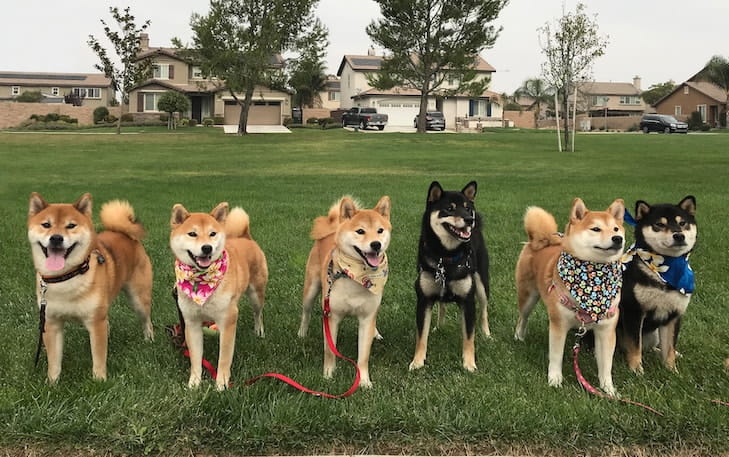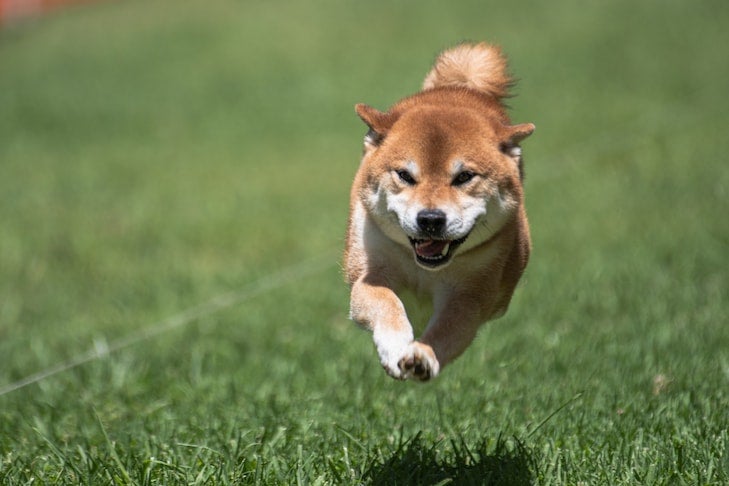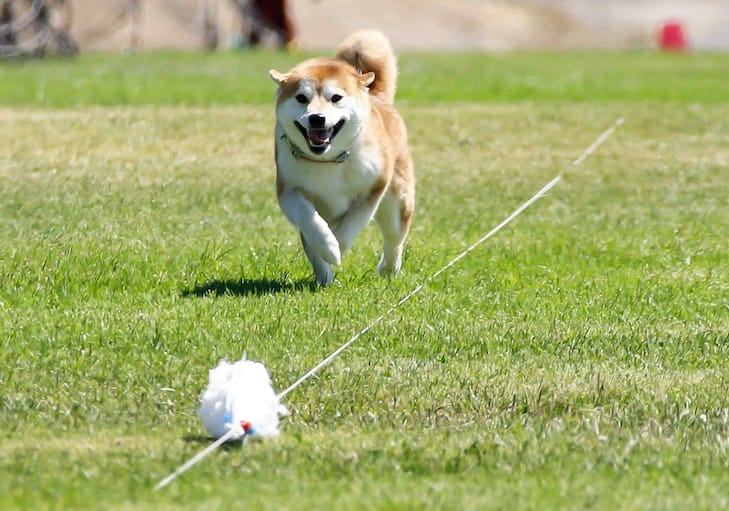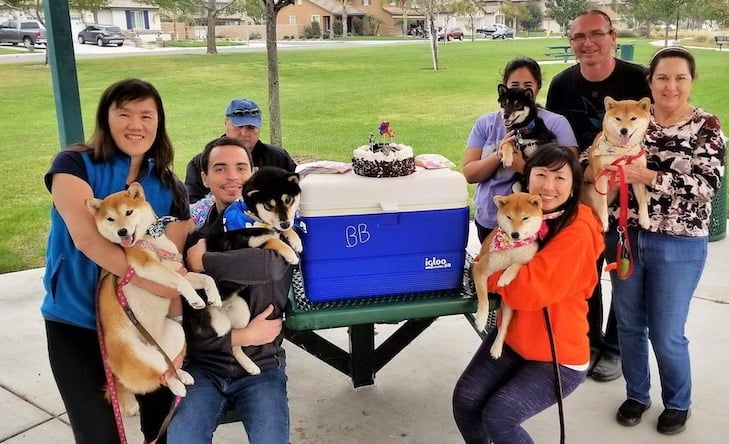
|
Watch all five Shiba Inus in the Hanabi F litter chase a lure in AKC FastCAT® competition, but don’t blink. If you do, you might miss them.
Tabitha and Johnny Szary’s F litter of Hanabi Shibas all compete in the speed-driven dog sport. Hiro, the dogs’ 6-year-old sire, runs too, and all six Shibas rank in FastCAT’s top 20 for their breed. Yo Yo, Hanabi’s Chiyoko, the dam of the fast and furious five, also recently pursued her first lure.
“F” Bombs Through the Course
As a group, the Hanabi F litter qualifies as some of the speediest Shibas around. Nicknamed the “F-Team,” they’re members of the Non-Sporting Group and AKC-registered with the fifth letter of the alphabet and Japanese call names: Fuji, Kira, Mizuki, Fumiyo aka Foo, and Fate.
With sprinting speeds up to over 25 miles per hour, they could change their names to Swifty, Speedball, Greased Lightning, Lickety Split, and Bat Out of Heck, because they’re all that fast.
As of October 24, 2019, here are the rankings and stats on these supersonic stars:
- Mizuki (Hanabi Mizuki CAA BCAT), red female, #2 with 25.61 mph. Owned by Kitsum Li, Pacifica, CA.
- Fuji (Hanabi Dark Star CAX BCAT), black and tan male, #11 with 24.04 mph. Owned by Elisa Gong, San Francisco, CA.
- Kira (Hanabi Kirara CAX DCAT), red female, #13 with 23.81 mph. Owned by Elisa Gong, San Francisco, CA.
- Foo (Hanabi No Fumiyo Go Hanabisou CAA BCAT), red female, #14 with 23.40 mph. Owned by Jeri Burnside, Chino, CA.
- Fate (Hanabi Fate CA) black and tan female, #17 with 22.81 mph. Owned by Heather Griffith, Panorama City, CA.
Currently, Hiro, the litter’s sire, Ch. Meinan No Hiroshi Go Meinansou Higashi CAA DCAT, ranks #9 with 24.30 mph. Hiro is owned by the Szary breeders.

What Is FastCAT?
Despite its name, FastCAT has nothing to do with going after felines. The CAT stands for Coursing Ability Test, and the event is designed for owners new to dog sports.
FastCAT taps into a dog’s instinct to chase prey. In the world of FastCAT, that prey is a plastic bag on a wire, acting as an artificial lure. In a timed 100-yard dash, dogs run individually, and their times are clocked in miles per hour. They receive points toward titles and can achieve standings in national rankings by breed. The fastest dogs can reach speeds of 35 to 45 mph.
Many dogs, including the F-team, who compete in FastCAT add additional Coursing titles after their names:
- CA (Coursing Ability) – Three qualifying scores in the Coursing Ability Test from two different judges at three different tests. The dog must complete the course with enthusiasm and without interruption within a stated maximum amount of time.
- CAA (Coursing Ability Advanced) – Ten qualifying scores in the Coursing Ability Test.
- BCAT – Requires 150 points earned at FastCAT events.
- CAX (Coursing Ability Excellent) –25 qualifying scores in the Coursing Ability Test
- CAX2 – 50 qualifying scores in the Coursing Ability Test.
Why Shiba Inus?
Seventeen years ago, when the Szarys of Northern California bought their first Shiba Inu, they weren’t looking for a breed on speed dial. The 17- to 23-pound ancient Japanese dog appealed to them because of its independent nature, bold spirit, and small size.
“We researched breeds and made several trips to Japan to attend their big National Shiba Inu shows with over 1,400 Shibas,” Johnny Szary says. “Shibas were bred to find and chase prey, but we didn’t expect ours to catch lizards, possums, and gophers.”
“We bred to improve the breed in both the NIPPO (Nihon Ken Hozonkai, or Association for the Preservation of Japanese Dog Shows) and AKC breed standards,” he affirms. “We take temperaments of the sire and dam into consideration and focus on breeding well-rounded, happy dogs. We’ve seen this passed on to the offspring and it makes for nicer pets who are easier to train.”
Szary believes that the Shibas’ genetic high-prey drive predisposes them to excel at the AKC sports of Agility, Coursing Ability, Barn Hunt, and Scent Work.
“Regular training and utilizing positive reinforcement techniques go a long way in keeping Shibas focused on the task and making it fun for them,” he says.
Discovering Dog Sport Success

How did all this Hanabi zipping around get off the ground in the first place?
“Two years ago, we entered Ayumi, a female from our first litter, in FastCAT for the first time,” says Johnny Szary. “Shibas are known for chasing after prey and we wanted to see if she would take to it.”
Dogs don’t usually catch the lure at the end of the course, but when Ayumi grabbed the plastic, she flashed a huge Shiba grin.
“We had a hard time getting it away from her, so we knew she loved the sport, and we had to keep taking her,” he says.
The Szarys, who also compete in conformation, began introducing other Shibas from subsequent litters to FastCAT. The breeders encouraged their puppy buyers to join them, but many are too far away.
“The F-team owners all live nearby and came to our puppy parties, which allowed them to get to know one another,” says Szary. “FastCAT opened a whole new world for us, as it’s such a nice way to involve puppy people and introduce them to AKC sports.”
For Jeri Burnside, training Foo can be challenging. Burnside began showing Foo in conformation, but when she didn’t love it, the owner decided to give her a break and try FastCAT.
“Finding what motivates a Shiba is key,” says Burnside.”This primitive, cat-like, and intelligent breed chooses whether to please you or not. Without any training, she instantly knew what to do, and screams to start the course. Now I’m showing Foo in conformation again, as she’s more mature and receptive.”
Fast And Furious New Friends
When Elisa Gong of San Francisco and Kitsum Li of Pacifica, California, bought their Shibas Kira and Fuji, and Mizuki from the Szarnys, they never expected a social group to develop.

“Kitsum and I took our dogs on a road trip to Portland, Seattle, and Vancouver, and we had a great time,” says Gong. “All of us in the F-Team have become friends and get together at FastCAT and for brunch, birthday parties, or playdates. I think it’s exciting that we’ve all become good friends and family.”

